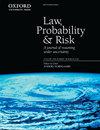The Rise of Transnational Corporations in the Human Rights Age-Attaining Sustainable Development while Respecting Human Rights
IF 1.4
4区 社会学
Q1 LAW
引用次数: 0
Abstract
We can no longer afford to bury our heads in the sand for we must appreciate the reality which is that private individuals and bodies such as clubs and companies wield great power over individual citizenry who should, as of necessity, be protected from such non-state bodies who may for instance discriminate unfairly or cause other constitutional breaches It is beyond peradventure that, non-state actors such as transnational corporations wield much power and often violate human rights. As opposed to the traditional view, such non state actors too have a responsibility to respect and promote human rights. This paper discusses the extent to which non-state actors are held responsible for human rights violation both under international human rights law as well as under comparative constitutional law. Philosophical as well as theoretical justifications for adopting such a position to hold non state actors responsible for human rights violations are also discussed.跨国公司在人权时代的兴起——在尊重人权的同时实现可持续发展
我们不能再把头埋在沙子里,因为我们必须认识到这样一个现实,即私人和团体,如俱乐部和公司,对公民个人行使着巨大的权力,公民个人应该受到必要的保护,免受这些非国家机构的侵害,例如,这些非国家机构可能会不公平地歧视或造成其他违反宪法的行为。与传统观点相反,这些非国家行为体也有责任尊重和促进人权。本文讨论了在国际人权法和比较宪法下非国家行为体对侵犯人权行为负责的程度。还讨论了采取这种立场使非国家行为者对侵犯人权行为负责的哲学和理论理由。
本文章由计算机程序翻译,如有差异,请以英文原文为准。
求助全文
约1分钟内获得全文
求助全文
来源期刊

Law Probability & Risk
MATHEMATICSSTATISTICS & PROBABILITY&-STATISTICS & PROBABILITY
CiteScore
2.10
自引率
28.60%
发文量
8
期刊介绍:
Law, Probability & Risk is a fully refereed journal which publishes papers dealing with topics on the interface of law and probabilistic reasoning. These are interpreted broadly to include aspects relevant to the interpretation of scientific evidence, the assessment of uncertainty and the assessment of risk. The readership includes academic lawyers, mathematicians, statisticians and social scientists with interests in quantitative reasoning.
The primary objective of the journal is to cover issues in law, which have a scientific element, with an emphasis on statistical and probabilistic issues and the assessment of risk.
Examples of topics which may be covered include communications law, computers and the law, environmental law, law and medicine, regulatory law for science and technology, identification problems (such as DNA but including other materials), sampling issues (drugs, computer pornography, fraud), offender profiling, credit scoring, risk assessment, the role of statistics and probability in drafting legislation, the assessment of competing theories of evidence (possibly with a view to forming an optimal combination of them). In addition, a whole new area is emerging in the application of computers to medicine and other safety-critical areas. New legislation is required to define the responsibility of computer experts who develop software for tackling these safety-critical problems.
 求助内容:
求助内容: 应助结果提醒方式:
应助结果提醒方式:


